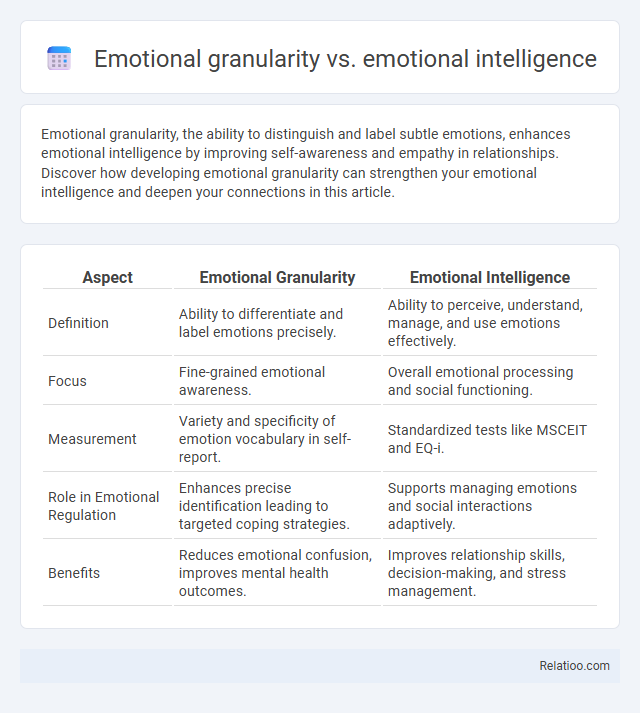Emotional granularity, the ability to distinguish and label subtle emotions, enhances emotional intelligence by improving self-awareness and empathy in relationships. Discover how developing emotional granularity can strengthen your emotional intelligence and deepen your connections in this article.
Table of Comparison
| Aspect | Emotional Granularity | Emotional Intelligence |
|---|---|---|
| Definition | Ability to differentiate and label emotions precisely. | Ability to perceive, understand, manage, and use emotions effectively. |
| Focus | Fine-grained emotional awareness. | Overall emotional processing and social functioning. |
| Measurement | Variety and specificity of emotion vocabulary in self-report. | Standardized tests like MSCEIT and EQ-i. |
| Role in Emotional Regulation | Enhances precise identification leading to targeted coping strategies. | Supports managing emotions and social interactions adaptively. |
| Benefits | Reduces emotional confusion, improves mental health outcomes. | Improves relationship skills, decision-making, and stress management. |
Understanding Emotional Granularity
Emotional granularity refers to your ability to identify and differentiate between subtle variations in emotions, enhancing emotional awareness and regulation. While emotional intelligence encompasses a broader skill set including empathy, social skills, and emotional management, emotional granularity specifically sharpens your perception of emotional nuances. Understanding emotional granularity helps you respond more precisely to your feelings, improving mental health and interpersonal relationships.
Defining Emotional Intelligence
Emotional intelligence refers to the ability to recognize, understand, and manage your own emotions while effectively perceiving and influencing the emotions of others. Emotional granularity is a component of this skill set, involving the precise identification and differentiation between nuanced emotional states, which enhances emotional regulation and decision-making. Developing strong emotional intelligence improves interpersonal relationships and personal well-being by enabling clearer communication and empathy.
Key Differences Between Emotional Granularity and Emotional Intelligence
Emotional granularity refers to the ability to precisely identify and differentiate subtle feelings, while emotional intelligence encompasses broader skills like recognizing, understanding, managing emotions, and empathizing with others. The key difference lies in emotional granularity's focus on specific, nuanced emotional experiences versus emotional intelligence's comprehensive capacity to navigate and regulate emotions effectively. Enhancing your emotional granularity sharpens your emotional vocabulary, which in turn strengthens your overall emotional intelligence and interpersonal communication.
The Science Behind Emotional Granularity
Emotional granularity refers to the ability to precisely identify and label one's emotional experiences with specific terms, enhancing emotional understanding and regulation. Unlike emotional intelligence, which encompasses a broader set of skills including recognizing, managing, and influencing emotions across oneself and others, emotional granularity specifically emphasizes the nuanced differentiation of emotions. Neuroscientific research highlights that individuals with high emotional granularity activate distinct neural networks related to emotion processing, enabling improved psychological resilience and adaptive coping strategies.
Components of Emotional Intelligence
Emotional intelligence encompasses self-awareness, self-regulation, motivation, empathy, and social skills, enabling you to navigate interpersonal relationships effectively. Emotional granularity refers to the ability to identify and label emotions with precision, enhancing emotional clarity and regulation. Together, these components empower emotional competence by combining broad emotional understanding with nuanced emotional differentiation.
How Emotional Granularity Enhances Emotional Intelligence
Emotional granularity enhances emotional intelligence by enabling you to identify and differentiate subtle variations in your feelings, which leads to more precise emotional awareness and regulation. High emotional granularity improves decision-making and interpersonal communication by providing a richer emotional vocabulary, allowing for better expression and understanding of complex emotions. This refined emotional insight strengthens your capacity to respond adaptively in social and professional contexts, deepening emotional intelligence overall.
Measuring Emotional Granularity and Emotional Intelligence
Measuring emotional granularity involves assessing your ability to identify and differentiate specific emotions with precision, often through experience sampling methods or emotion differentiation tasks. Emotional intelligence measurement typically includes evaluating skills such as emotional awareness, regulation, and interpersonal empathy using standardized tools like the Mayer-Salovey-Caruso Emotional Intelligence Test (MSCEIT) or self-report questionnaires. Understanding these distinct yet complementary constructs enables more accurate insights into emotional functioning and personal well-being.
Benefits of Developing Emotional Granularity
Developing emotional granularity enhances emotional intelligence by enabling individuals to identify and differentiate nuanced emotions accurately, leading to better emotional regulation and decision-making. High emotional granularity contributes to improved mental health, reduced stress, and stronger interpersonal relationships by fostering clearer communication and empathy. Unlike general emotional intelligence, emotional granularity provides precise emotional awareness, which empowers more adaptive coping strategies and resilience in daily life.
Emotional Intelligence Skills in Daily Life
Emotional intelligence skills in daily life involve recognizing, understanding, and managing your own emotions as well as empathizing with others to improve communication and relationships. Emotional granularity refers to the ability to precisely identify and label subtle emotional experiences, which enhances emotional regulation and decision-making. While emotional intelligence encompasses broader competencies like social skills and self-awareness, developing emotional granularity sharpens your emotional vocabulary, leading to more effective emotional intelligence application.
Strategies to Improve Emotional Granularity and Emotional Intelligence
Improving emotional granularity and emotional intelligence requires deliberate strategies such as mindfulness practice, journaling, and expanding your emotional vocabulary to precisely identify and articulate feelings. Developing these skills enhances your ability to manage emotions effectively, fostering better interpersonal relationships and decision-making. You can also engage in reflective exercises and seek feedback to increase self-awareness and empathy, which are critical components of both emotional granularity and emotional intelligence.

Infographic: Emotional granularity vs Emotional intelligence
 relatioo.com
relatioo.com